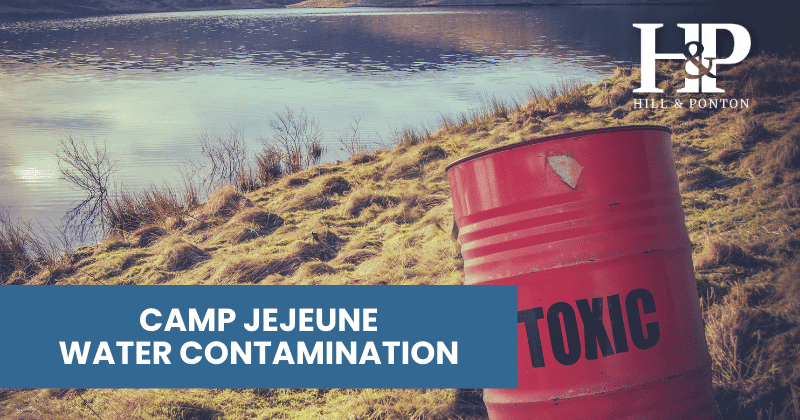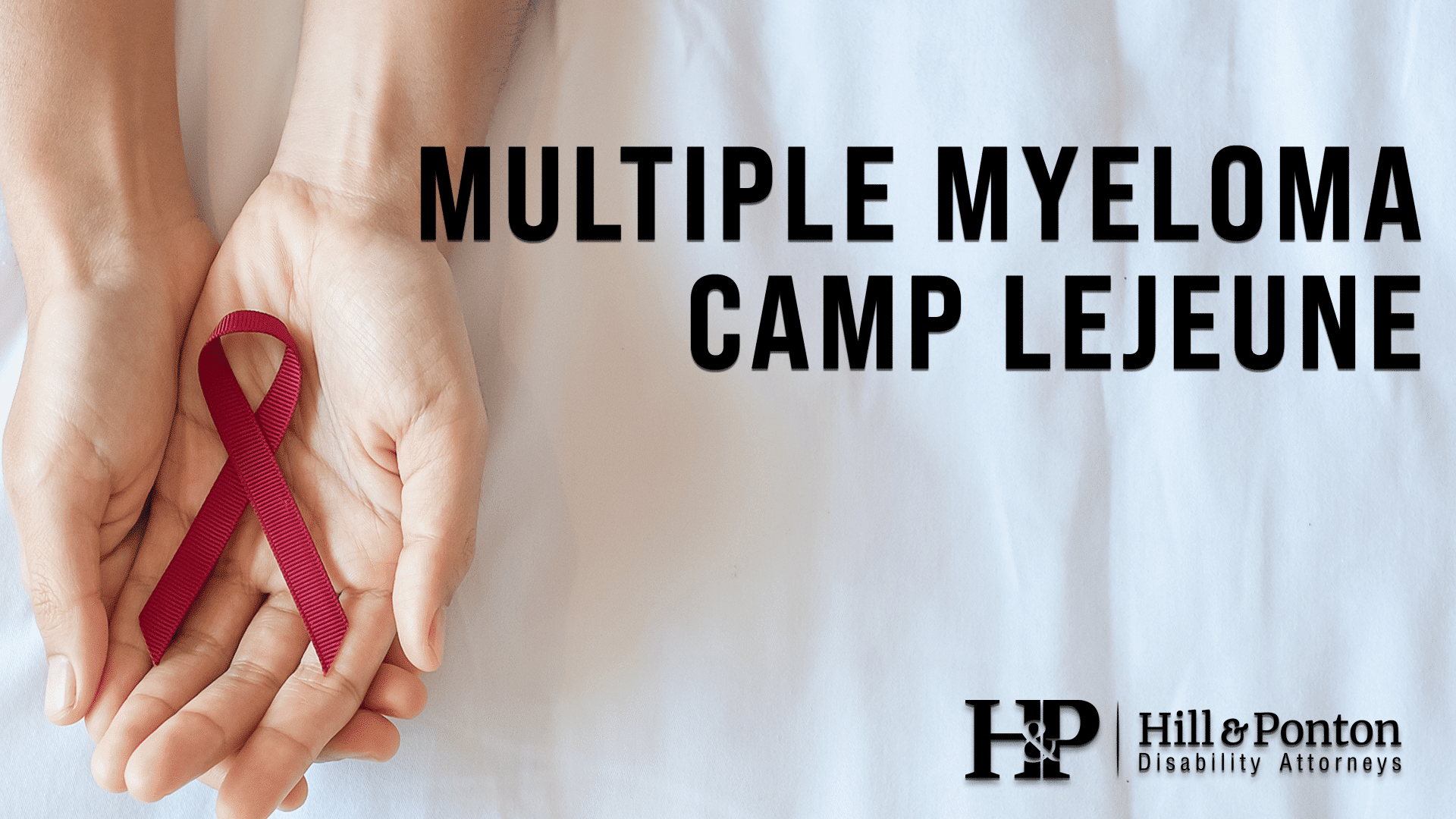In the early 1980s, two on-base water supply systems at the Camp Lejeune military base were contaminated with toxic chemicals and volatile organic compounds such as trichloroethylene (TCE), perchloroethylene (PCE), benzene, and vinyl chloride.
For many years, the VA has refused to recognize that the contaminated drinking water at Camp Lejeune was directly associated with certain health conditions. This made it challenging for Camp Lejeune veterans to obtain service-connected compensation for their illnesses.
Now, the VA has finally decided to officially recognize that some conditions are, in fact, due to the contaminated water at Camp Lejeune. What does this mean for your claim for disability benefits? It means for some conditions, you will not have to prove a link between your diagnosis and your military service.
In other words, the VA will grant presumptive service connection. The following conditions are presumed to be associated with the chemicals in the water at Camp Lejeune:
- Adult leukemia
- Aplastic anemia and other myelodysplastic syndromes
- Bladder cancer
- Kidney cancer
- Liver cancer
- Multiple myeloma
- Non-Hodgkin’s lymphoma
- Parkinson’s disease
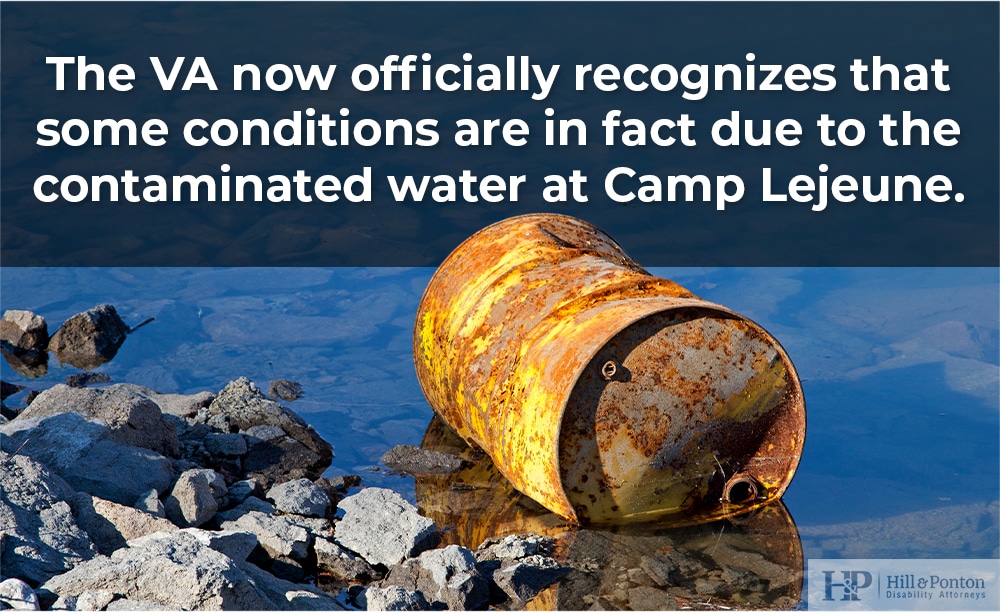
The VA, Camp Lejeune, and Developing Kidney Cancer
Today’s post will look specifically at kidney cancer, and how to get the most out of your claim for kidney cancer. The VA, together with the Agency for Toxic Substances and Disease Registry (ATSDR), has concluded that the contaminants in the water at Camp Lejeune are linked to a veteran’s increased risk of developing chronic kidney disease and kidney cancer. So, Camp Lejeune veterans that have developed kidney cancer will be entitled to service connection for their condition.
First, let’s look at a brief overview of the warning signs associated with kidney cancer and the diagnosis process. Some possible signs and symptoms of kidney cancer include:
- Blood in the urine (referred to sometimes as hematuria)
- Low back pain on one side (which is not caused by injury)
- A mass/lump on the side or lower back
- Fatigue
- Loss of appetite
- Weight loss (which is not the result of dieting)
- Fever that is not caused by an infection, and also does not go away
- Anemia (low red blood cell counts)
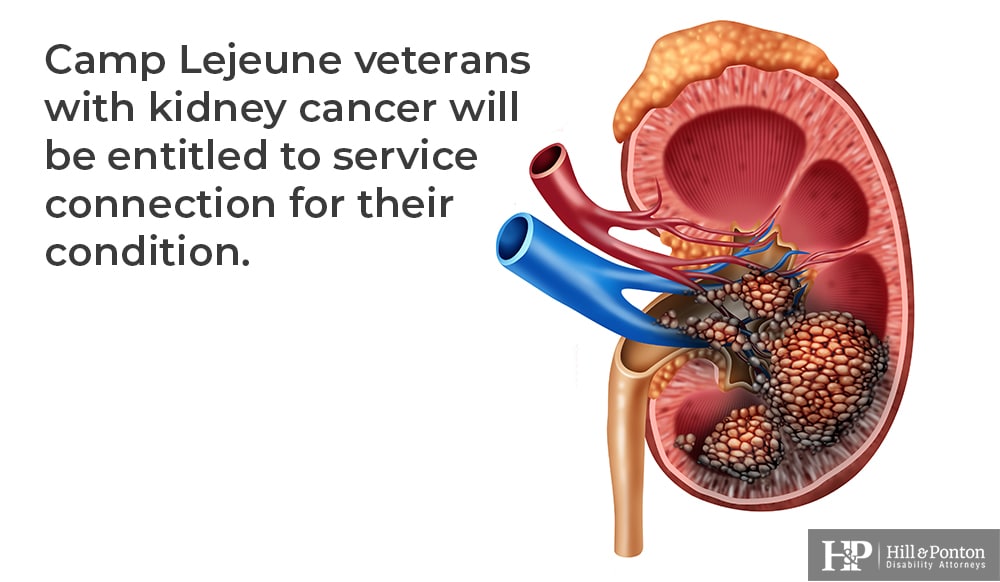
The above signs and symptoms associated with kidney cancer could be caused by numerous other conditions, but if someone has these symptoms, a doctor can then run tests for a formal diagnosis.
Kidney cancer is diagnosed through a series of lab tests and imaging tests such as urinalysis, complete blood count tests, blood chemistry tests, x-rays, MRIs, ultrasounds, etc. For more information on diagnosing kidney cancer click here.
VA Ratings for Kidney Cancer Explained
Now that the VA presumes service connection for Camp Lejeune veterans with kidney cancer, the focus can shift from proving service connection to making sure the VA assigns the correct rating. This is important because the VA frequently makes mistakes when assigning a rating, which can mean the difference between hundreds or even thousands of benefits.
When rating any condition, the VA looks at specific rating criteria associated with the relevant condition. The rating criteria for each condition can be found by looking up the diagnostic code for the condition. The diagnostic code is a four-digit number assigned to a condition and can be thought of as the identifier for a condition.
Kidney Cancer Rating Criteria and Diagnostic Codes
There are two different diagnostic codes associated with kidney cancer:
- DC 7528: Malignant (active) cancer
- DC 7529: Benign (non-cancerous) tumors
If the kidney cancer is malignant (cancerous), it will be rated 100% while active and then for six months after the last treatment. After the six months, the VA requires the condition to be re-evaluated. If the cancer is no longer active, then the rating will be based on any residuals. In other words, when the cancer is no longer active, it is rated according to the criteria for diagnostic code 7529.
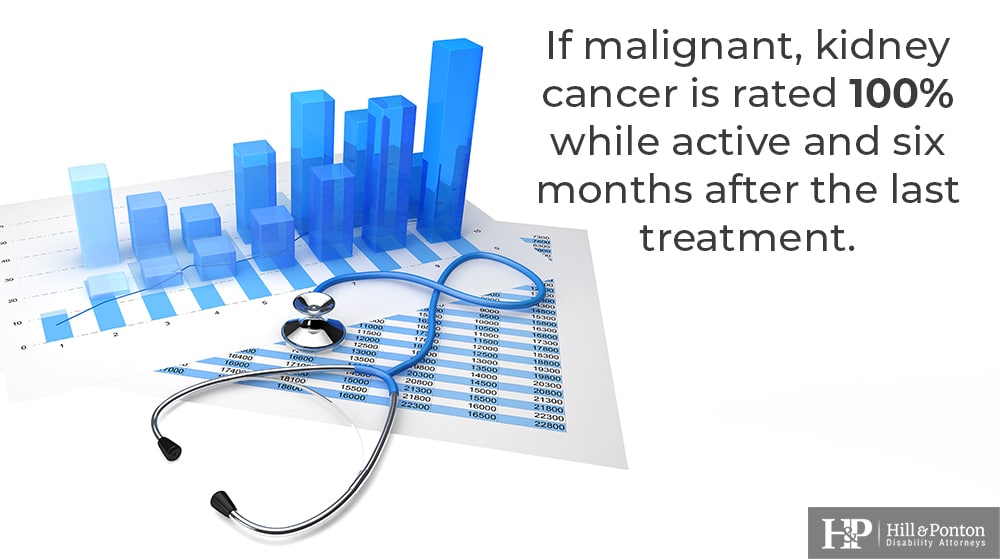
VA Ratings for Voiding Dysfunction and Renal Toxicity claims
When evaluating the residuals associated with previously active kidney cancer, the VA will look at voiding dysfunction or renal dysfunction (renal toxicity), whichever is the main problem. Voiding dysfunction is when the bladder does not function properly, while renal dysfunction is when the kidneys themselves don’t function properly.
Voiding dysfunction affects the body’s urinary system and will be rated according to the urinary rating system for voiding dysfunction:
- 60% rating: Required use of a catheter or other urinary assistive appliance, or causes required use of absorbent materials (for example, Depends) that must be changed more than 4 times a day
- 40% rating: Required use of absorbent materials that need to be changed 2 to 4 times a day
- 20% rating: Required use of absorbent materials that need to be changed once a day
Renal toxicity dysfunction affects the kidneys rather than the urinary system and is rated under the renal rating system (for each rating there must be one or more of the criteria present):
- 100% rating: Regular dialysis is required, the body can’t perform any physical activity due to persistent edema or albuminuria, there is a BUN of more than 80 mg/dL, a creatinine level of 9 mg/dL or more, OR a severely decreased functioning of the kidneys or other organs due to kidney dysfunction
- 80% rating: Persistent edema and albuminuria with a BUN of 40 to 80 mg/dL, a creatinine level of 4 to 8 mg/dL, OR overall poor health with symptoms like lethargy, weakness, anorexia, weight loss, or the inability to exert much energy
- 60% rating: Constant albuminuria with some edema, a definite decrease in kidney function, OR hypertension with the average diastolic pressure of 120 or more.
- 30% rating: Occasional or slight edema, hypertension with the average diastolic pressure of 100 or more or the average systolic pressure of 160 or more, albumin is present in the urine with either hyaline and granular casts or red blood cells.
- 0% rating: Hypertension with an average diastolic pressure of less than 100 or average systolic pressure of less than 160, or albumin and casts are present in the urine with a history of nephritis.
PACT Act Brings Redemption to Civilians at Camp LeJeune too!
For years, only veterans could potentially receive disability compensation from their exposure to the contaminated toxic water at Camp LeJeune but now the Honoring Our PACT ACT of 2022 includes elements of the former Camp Lejeune Justice Act.
The important piece to note is that this is not just a VA benefit. Even if you are not eligible for certain VA benefits due to being a civilian or a dependent of a veteran, you still could be eligible for help when this becomes law, as a separate lawsuit that can now be filed; previously, this was impossible.

